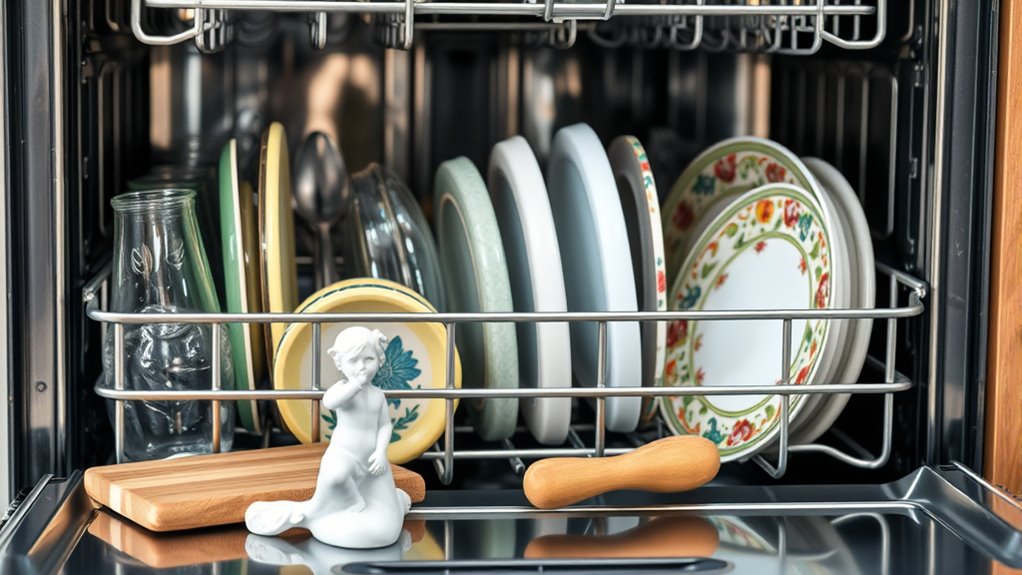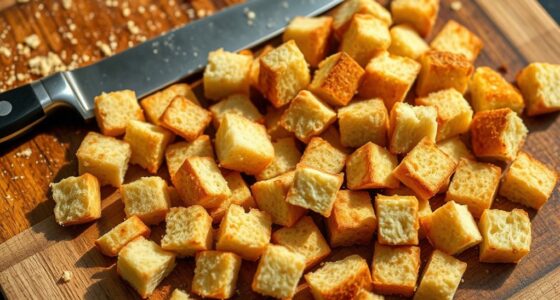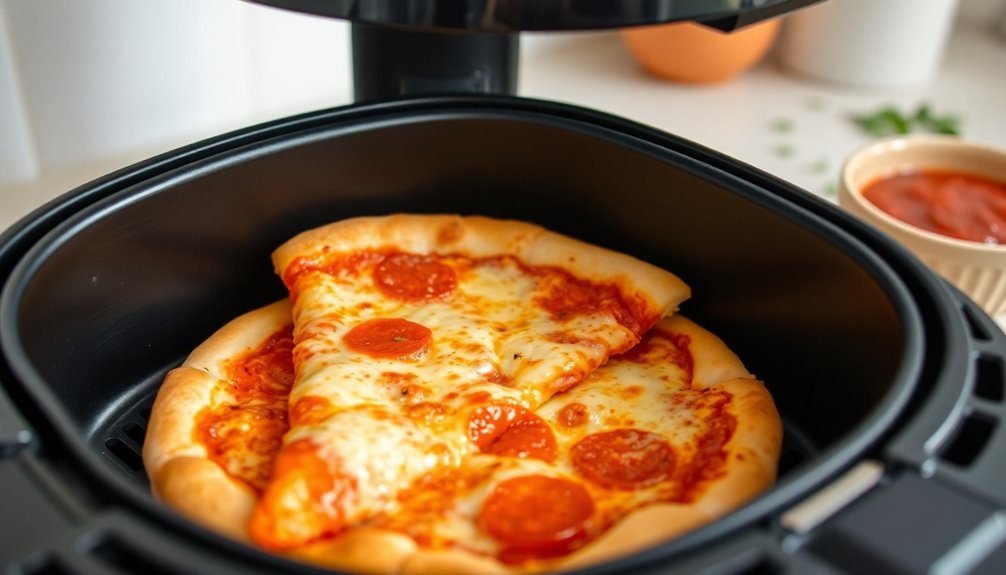You can put items like stainless steel, glass, dishwasher-safe plastics, and durable ceramics in the dishwasher for easy cleaning. However, avoid using it for wooden utensils, cast iron, delicate crystal, nonstick cookware, or items with wood or copper parts, as they can be damaged. Be cautious about not overloading and checking labels to prevent mishaps. To keep your dishes in top shape, it’s helpful to know what can and can’t go in—more details are just ahead.
Key Takeaways
- Dishwasher safe items include stainless steel, glass, durable plastics, and certain ceramics; always check labels and manufacturer instructions.
- Hand wash delicate items like antique glassware, wood, cast iron, copper, and natural stone to prevent damage.
- Avoid dishwasher use for nonstick cookware, fine china, crystal, and items with decorative finishes, as they can chip, tarnish, or warp.
- Overloading the dishwasher can block water flow, reducing cleaning effectiveness and risking damage to items.
- Regularly clean dishwasher filters and spray arms to maintain proper function and prevent mechanical issues.
Items That Are Generally Dishwasher Safe
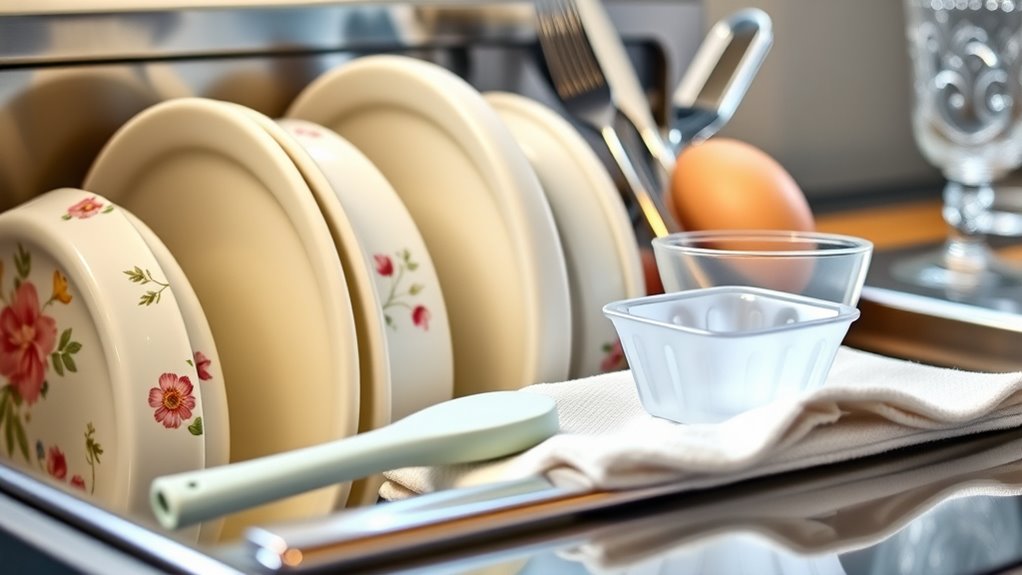
Many common kitchen items are designed to withstand dishwasher cycles, making cleanup easier for you. Items like stainless steel, glass, and plastic kitchenware are typically dishwasher safe, especially when marked or labeled accordingly. Durable ceramics, tempered glass baking dishes, and stoneware usually withstand washing in the dishwasher if you follow manufacturer instructions. Common utensils such as silicone spatulas and metal cutlery are generally safe, especially when placed on the top rack. Many modern appliances, including blender jars and food processor bowls, are also designed to be dishwasher safe for added convenience. Always check for manufacturer instructions or labels before placing items in the dishwasher. Using dishwasher safe items ensures durability and saves you time while maintaining your kitchenware’s quality. Additionally, dishwasher safety guidelines can help prevent damage to delicate or non-compatible items. For example, some electric bike components, like motor controllers or batteries, are not designed for dishwasher cleaning and should be kept away from water to avoid damage. Understanding kitchenware durability can help you make better choices and prolong the life of your items. Moreover, being aware of the types of materials that are dishwasher safe can help you avoid accidental damage to your delicate or specialized kitchenware.
Kitchenware to Hand Wash Only
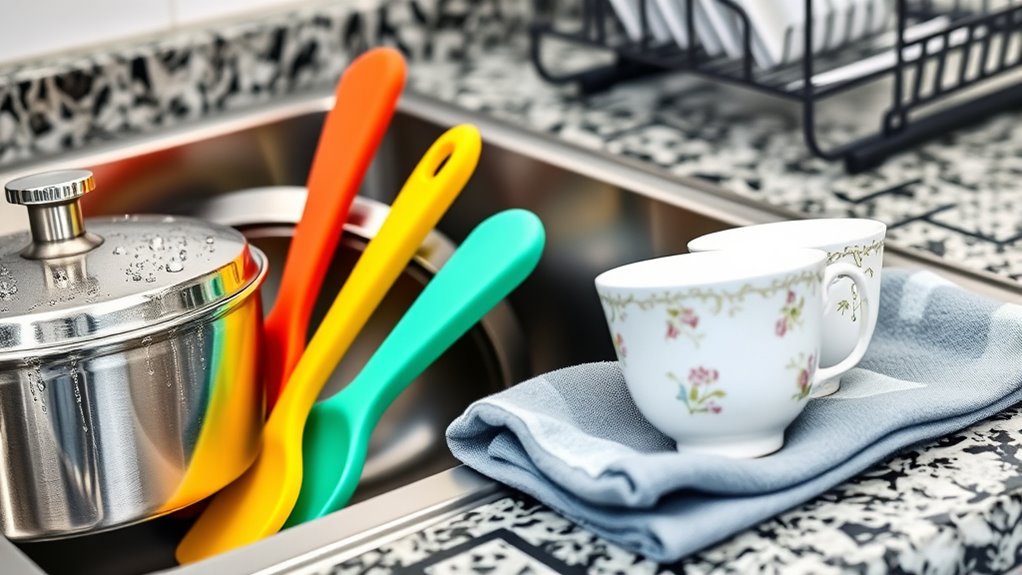
Ever wonder which kitchen items require gentle hand washing to stay in top condition? Here are three key items to wash carefully by hand:
Identify kitchen essentials like wood, cast iron, and delicate glassware that benefit from gentle hand washing.
- Wooden cutting boards, utensils, and salad bowls need hand washing to prevent cracking, splitting, and mold caused by moisture exposure. Using proper cleaning techniques helps prolong their lifespan.
- Cast iron cookware should be washed and dried immediately to prevent rust and preserve its seasoning, as dishwashers damage the surface.
- Delicate glassware like antique ceramics and crystal glassware must be hand washed to avoid chipping, fading, or tarnishing. Nonstick cookware also benefits from hand washing, as dishwasher detergents and high heat can damage the nonstick coating. Proper cleaning techniques, including understanding the contrast ratio, can help maintain the visual quality of your kitchenware. By treating these items gently, you keep your kitchenware in pristine condition longer.
Materials That Require Special Care
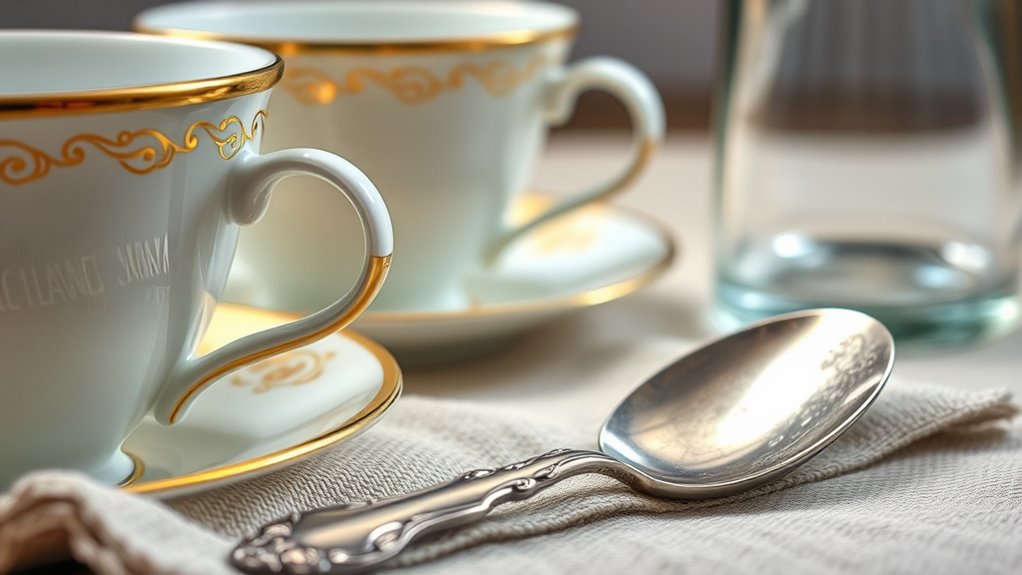
Certain materials in your kitchen demand extra attention to keep them in top condition. Wooden handles, cutting boards, utensils, and salad bowls should always be hand-washed to prevent cracking, splitting, and mold growth caused by moisture and heat. Cast iron cookware, including skillets and Dutch ovens, needs immediate drying after cleaning to avoid rust and preserve its seasoning; a dishwasher will tarnish their protective coating. Non-stick coatings, like Teflon, can deteriorate from dishwasher detergents and high temperatures, so washing by hand is best. Copper pots and mugs are prone to tarnish and discoloration when exposed to dishwasher detergents and heat. Natural stone items, such as marble or granite, can crack or sustain surface damage if cleaned in the dishwasher due to harsh detergents and water pressure. Trust issues in relationships can also be exacerbated by improper handling of emotional boundaries, highlighting the importance of clear communication and care. Additionally, material durability varies greatly, and understanding the specific needs of each item helps maintain their longevity. Proper care can also help prevent material degradation, which occurs when materials are exposed to inappropriate cleaning methods or environmental factors. Regular maintenance and awareness of each material’s cleaning requirements are essential for preserving their appearance and function over time. For example, certain self watering plant pots require specific handling to ensure their watering systems function properly over time.
Common Mistakes When Using the Dishwasher
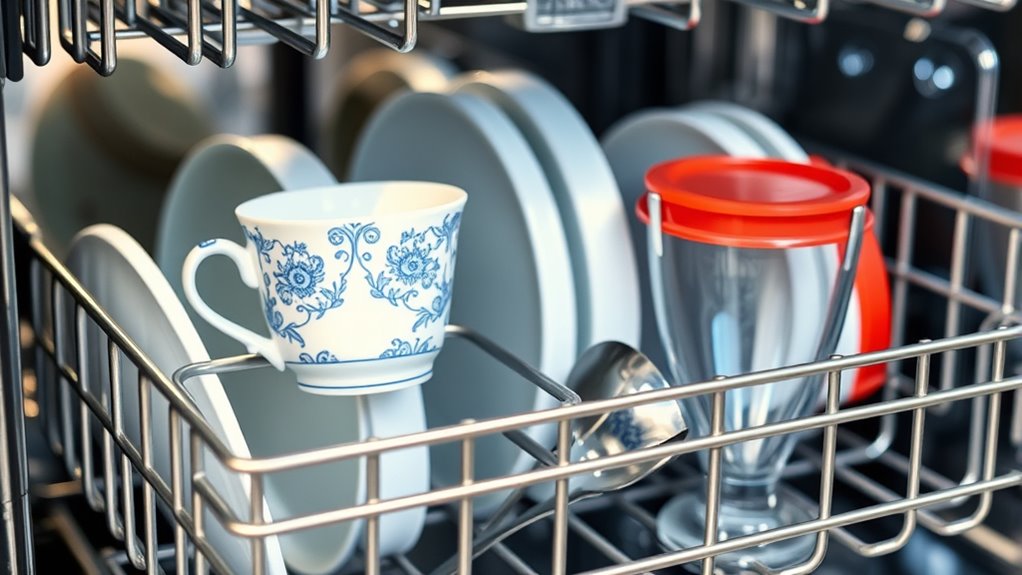
Using the wrong techniques or making common mistakes when operating your dishwasher can undermine its cleaning efficiency and damage your items. To avoid these issues, keep these points in mind:
- Don’t overload the dishwasher, as it blocks water circulation, leaving dishes dirty.
- Be cautious with delicate items—avoid washing fine china, crystal, or plastic items not labeled as dishwasher safe.
- Remove labels and adhesives before washing; they can clog filters and cause mechanical problems.
- Use gentle detergents on sensitive materials to prevent discoloration or warping.
- Never wash items like cast iron or wooden utensils in the dishwasher, since they can rust or crack.
- Consider the use of specialized materials like eye patches and their compatibility with dishwasher cleaning methods to prevent damage. Additionally, some yoga accessories may be sensitive to high temperatures and should be cleaned manually to preserve their integrity.
- Regularly clean your dishwasher’s filters and spray arms to maintain optimal performance and prolong its lifespan.
- Be aware that some materials may not withstand high-temperature cycles, leading to warping or degradation over time. Additionally, understanding the proper loading techniques can help ensure even cleaning and prevent damage to your dishes.
Avoid these common mistakes to protect your dishes and guarantee peak cleaning performance.
Tips for Proper Dishwashing and Maintenance
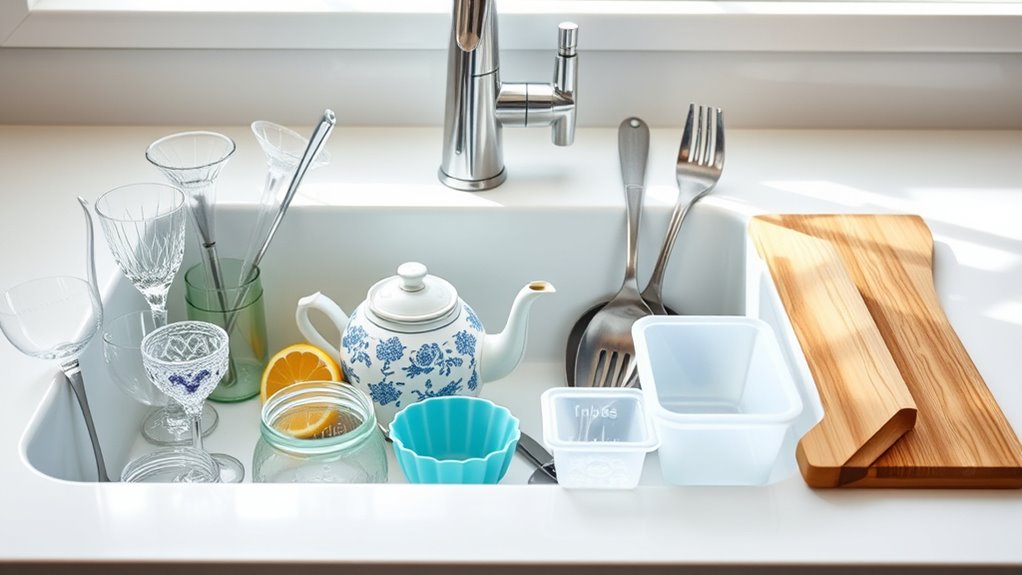
To guarantee your dishwasher operates efficiently and lasts longer, it’s essential to follow proper dishwashing and maintenance practices. Always check manufacturer labels for material safety guidelines. Place delicate glassware and fine china on the top rack, avoiding overcrowding to prevent damage. Items like cast iron, non-stick coatings, copper, and wood should be hand-washed to avoid deterioration. Before running the dishwasher, remove labels and adhesive residues to prevent clogging filters. Regularly inspect and clean your cleaning filters and spray arms to maintain ideal performance and prevent residue buildup. Proper machine maintenance extends your dishwasher’s life and ensures spotless results. Additionally, understanding dishwasher safety practices can help prevent accidents and damage during operation. Being aware of safe cleaning practices can further protect both your dishes and dishwasher components. Incorporating preventative maintenance routines can help identify potential issues early and avoid costly repairs. For optimal performance, consider scheduling periodic professional servicing to address potential issues early.
Frequently Asked Questions
What Is Not Allowed in the Dishwasher?
You should avoid putting certain items in the dishwasher to prevent damage. Cast iron cookware, non-stick pans, aluminum pots, wooden utensils, cutting boards, and handles can warp, crack, or discolor. Delicate china, especially vintage or hand-painted pieces, can chip or fade. Silverware may tarnish, and items with labels or glue can clog filters. Always hand-wash these items to preserve their condition and avoid costly repairs.
What Metals Cannot Go in the Dishwasher?
You should avoid putting copper, brass, silver, and sterling silver in the dishwasher. These metals tarnish or discolor when exposed to harsh detergents, high heat, and water. Aluminum cookware also isn’t dishwasher-friendly, as it can develop stains and dullness. Items with metallic finishes or paint may fade or chip. Metal utensils with hollow handles or glued parts can loosen or corrode, so it’s best to wash those by hand.
Why Can’t Stainless Steel Go in the Dishwasher?
Think of your stainless steel as a delicate ballet dancer, elegant but sensitive to harsh conditions. When you put it in the dishwasher, the high heat and aggressive detergents can tarnish its shine, cause water spots, or even corrode it over time. Repeated cycles strip protective layers, making your cookware more fragile. To keep it looking its best and lasting longer, hand wash your stainless steel items instead of dishwasher cleaning.
What Unusual Things Can You Put in the Dishwasher?
When considering unusual items for your dishwasher, think beyond typical dishes. You might safely clean composite wood or silicone pizza peels, stainless steel barware, or certain kitchen gadgets like hand blenders if instructions permit. However, avoid natural stone mortars or antique silverware, as the heat and detergents can damage them. Always check manufacturer guidelines to prevent damage, and remember that some items may look sturdy but aren’t dishwasher safe.
Conclusion
Think of your dishwasher as a trusted ship steering the seas of your kitchen. When you choose the right cargo—safe dishes and proper techniques—you guarantee a smooth voyage. But loading the wrong items or neglecting care can cause storms and leaks. Treat your dishwasher like a delicate vessel, respecting its limits and needs. With mindful habits, you’ll keep your kitchen sailing smoothly, turning dishwashing from a chore into a voyage of care and preservation.
